 Petzlover
Petzlover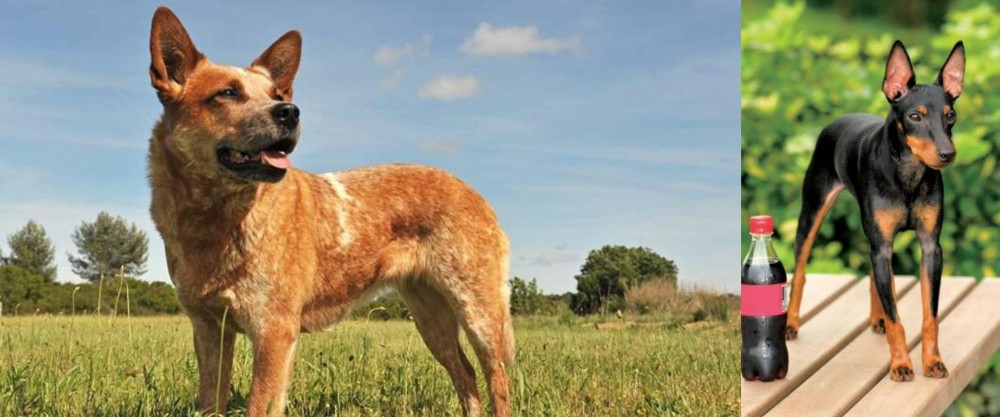 Australian Red Heeler is originated from Australia but Toy Manchester Terrier is originated from United Kingdom. Australian Red Heeler may grow 21 cm / 9 inches higher than Toy Manchester Terrier. Australian Red Heeler may weigh 12 kg / 27 pounds more than Toy Manchester Terrier. Both Australian Red Heeler and Toy Manchester Terrier has almost same life span. Both Australian Red Heeler and Toy Manchester Terrier has almost same litter size. Australian Red Heeler requires Moderate Maintenance. But Toy Manchester Terrier requires Low Maintenance
Australian Red Heeler is originated from Australia but Toy Manchester Terrier is originated from United Kingdom. Australian Red Heeler may grow 21 cm / 9 inches higher than Toy Manchester Terrier. Australian Red Heeler may weigh 12 kg / 27 pounds more than Toy Manchester Terrier. Both Australian Red Heeler and Toy Manchester Terrier has almost same life span. Both Australian Red Heeler and Toy Manchester Terrier has almost same litter size. Australian Red Heeler requires Moderate Maintenance. But Toy Manchester Terrier requires Low Maintenance
 When George Hall arrived in the New South Wales Colony in 1802 he set about ‘creating’ a tough working- or herding dog. By crossing Australia’s native Dingoes with Collies as well as with other herding dogs, the robust Red Heeler, also known as the Australian Cattle Dog came into being. Today he is a thick-set dog, ideally suited to working livestock.
When George Hall arrived in the New South Wales Colony in 1802 he set about ‘creating’ a tough working- or herding dog. By crossing Australia’s native Dingoes with Collies as well as with other herding dogs, the robust Red Heeler, also known as the Australian Cattle Dog came into being. Today he is a thick-set dog, ideally suited to working livestock.
Ranchers, particularly, were impressed with the breed’s toughness and they were sought after on cattle stations. The name actually comes from them when the dogs are herding animals, they nip at their heels to get them moving.
The Blue Heeler and the Red Heeler breed are the exact same dog, but just different colors. These Australian cattle dogs originated in Australia in the mid-1800s and adapted well to the harsh desert environment of the outback.
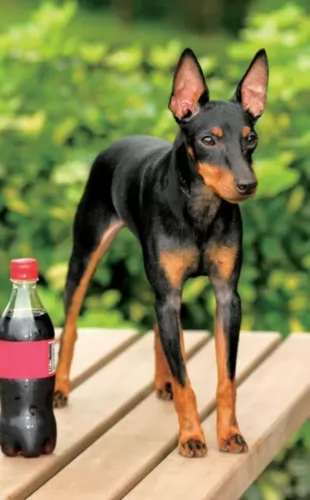 The Toy Manchester Terrier comes from Manchester and came about by breeding the Manchester Terrier with smaller dog breeds.
The Toy Manchester Terrier comes from Manchester and came about by breeding the Manchester Terrier with smaller dog breeds.
Looking like a Doberman Pinscher, the American Toy Manchester Terrier Club was formed in the 1930s and the dog was recognized in 1938 by the American Kennel Club.
It is believed that the Black and Tan Terrier was also possibly crossed with Whippets. The dog is categorized as a Terrier or as a Toy breed.
 The Red Heeler or Australian Cattle Dog is a sturdy, muscular dog with ears that are pricked and with dark, alert eyes. The tail is long. The neck, shoulders and legs of the Red Heeler are strong and muscular. The dog is longer than tall – the length of the body is greater than the height at the withers. A well fed, well exercised, well cared for Red Heeler will weight roughly 15–22 kilograms.
The Red Heeler or Australian Cattle Dog is a sturdy, muscular dog with ears that are pricked and with dark, alert eyes. The tail is long. The neck, shoulders and legs of the Red Heeler are strong and muscular. The dog is longer than tall – the length of the body is greater than the height at the withers. A well fed, well exercised, well cared for Red Heeler will weight roughly 15–22 kilograms.
There are 2 coat colours of the Reeler – red and blue, but there are are lesser varieties such as chocolate, cream, blue mottled, brindle and some with white markings. It is interesting to note that with both the Red- and the Blue Heeler, puppies are generally born white, with the coat turning to red as they mature.
These Australian Cattle Dogs display patches of solid colour, and you might well find masks over one or both eyes and a white tip to the tail. Both the Red and Blue Heeler can have a white star on the forehead which is referred to as the Bentley Mark. The Heelers have a double coat - short, straight outer hairs while the undercoat is short, fine and dense. Despite their short coat, they shed a lot.
 Looking much like a small Doberman Pinscher, the Manchester Terrier is the miniature version of the standard Manchester.
Looking much like a small Doberman Pinscher, the Manchester Terrier is the miniature version of the standard Manchester.
He weighs in the region of 2 to 5kg and stands at between 25 and 30cm in height. He has a sleek, short coat which is black and tan. He is lithe and muscular, bred back in the day to kill vermin. He has large, broad erect ears which taper to a point.
The Toy Manchester Terrier is a gentle but energetic dog, a great choice for an active family. Throw a ball and you’ll see how he loves to give chase, and he’ll also love his walk every day.
They’re adaptable too, so if you live in the countryside or the city, he can be your friend and companion there.
Training and socialization are excellent for all dogs, particularly ones with a stubborn, independent streak such as with this dog. He is intelligent and will learn quickly. They’re alert too so you can expect him to be a good watchdog.
 Your Australian Red Heeler needs plenty of exercise but also plenty of companionship too from his human family. He is an affectionate, playful pet but is reserved with people he doesn’t know. When socialized he is patient with children in the home but he does still have the tendency to herd them and nip at their heels. The dog builds up a strong bond with his human family, and is protective toward them, being happy to be close to his owner’s side.
Your Australian Red Heeler needs plenty of exercise but also plenty of companionship too from his human family. He is an affectionate, playful pet but is reserved with people he doesn’t know. When socialized he is patient with children in the home but he does still have the tendency to herd them and nip at their heels. The dog builds up a strong bond with his human family, and is protective toward them, being happy to be close to his owner’s side.
Red Heelers need activities and lots of room to play, and they therefore won’t adapt to apartment living. If you don’t live on a farm, don’t neglect your working dog as he will need lots of rough and tumble games and activities to keep him from boredom. Treat your Australian Red Heeler with the love, patience and kindness and you’ll bring out the very best from this active, loyal fur-friend of yours.
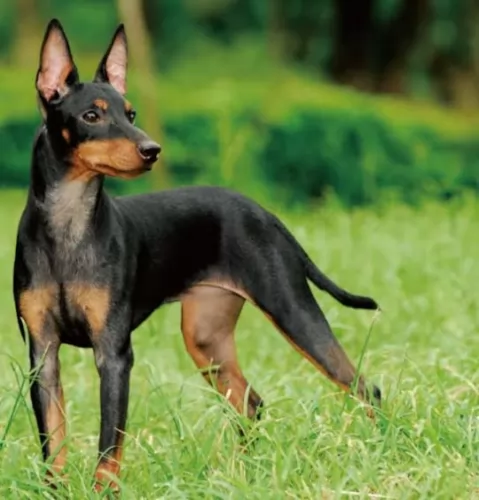 The Toy Manchester Terrier is full of beans and will provide you with lots of fun. They're sociable and love being in the presence of their human family.
The Toy Manchester Terrier is full of beans and will provide you with lots of fun. They're sociable and love being in the presence of their human family.
They get on well with kids and pets in the home and are brave, alert and feisty. He may be small, but he is full of personality and he’s just waiting to fill your home with his bright charm, promising to be a loyal, loving pet.
 The Australian Cattle Dog is quite often affected by progressive retinal atrophy, an eye condition where the rods and cones in the retina of the eye deteriorate later in life, and it could lead to blindness. This eye illness is an autosomal recessive trait, and even if the dog doesn’t develop the condition himself, he can be a carrier of the affected gene.
The Australian Cattle Dog is quite often affected by progressive retinal atrophy, an eye condition where the rods and cones in the retina of the eye deteriorate later in life, and it could lead to blindness. This eye illness is an autosomal recessive trait, and even if the dog doesn’t develop the condition himself, he can be a carrier of the affected gene.
The Heeler is just bursting with personality and energy and a study of dogs diagnosed at veterinary colleges described fractures and ligament tears as one of the most common conditions treated with the Australian Red Heeler.
You love your Australian Red Heeler and you want to take good care of him. Check with your vet because at 8 weeks he should be starting with his first puppy vaccinations.
To keep your best friend healthy and happy, watch his diet, ensure he gets plenty of exercise, brush his teeth regularly to remove plaque build-up, and always call your veterinarian when you see he is ill and isn’t his usual boisterous self.
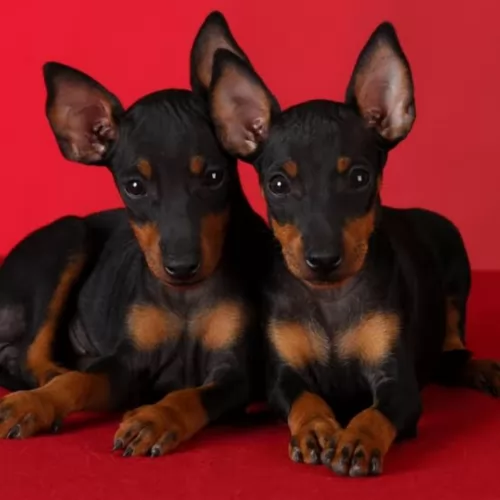 The Toy Manchester Terrier is a healthy dog breed and can reach anything between 14 and 16 years of age. Good food and exercise can stave off illness, but there are some common dog illnesses that any dog can succumb to.
The Toy Manchester Terrier is a healthy dog breed and can reach anything between 14 and 16 years of age. Good food and exercise can stave off illness, but there are some common dog illnesses that any dog can succumb to.
This occurs when there are problems with the thyroid hormone. You might find skin problems with your pet, lethargy and even hair loss. Your vet might suggest hormone replacement, but there are always natural products for dogs too.
This is when there is degeneration of the head on the femur bone so that there is also joint inflammation.
It is thought that the condition is brought on by problems with blood supply to the femoral head. Lameness sets in and then your vet will want a medical history of your pet’s health.
 The Australian Red Heeler is a low maintenance dog. He does shed quite a bit so you’ll need to brush his coat at least twice a week to remove loose hairs and to keep his coat lustrous. When your dog has been in a particularly dusty area, you you wipe his coat down with a damp cloth. As with all dogs, you’ll want to check his teeth, ears, eyes and nails regularly to avoid health problems.
The Australian Red Heeler is a low maintenance dog. He does shed quite a bit so you’ll need to brush his coat at least twice a week to remove loose hairs and to keep his coat lustrous. When your dog has been in a particularly dusty area, you you wipe his coat down with a damp cloth. As with all dogs, you’ll want to check his teeth, ears, eyes and nails regularly to avoid health problems.
If you care for your working- and herding dog you’ll train him to that he becomes a good family dog and companion. The Red Heeler has plenty of energy and stamina and if he grows up untrained and un-socialized, you could see him becoming aggressive towards other animals and even your own children. He certainly becomes over-protective of his territory if not socialized. Train him as he is an intelligent breed and responds well to training.
Any vet will tell you of the critical importance of a proper diet and exercise routine for your dog. He’s an active, smart dog with loads of energy and you want to keep his diet consistent with this energy. Speak to your vet about what food would suit your pet best, because a high quality diet appropriate to his age, his body size and his energy levels will be important. Along with high quality foods which include a good intake of raw meat, your dog must always have access to a bowl of fresh, cool water.
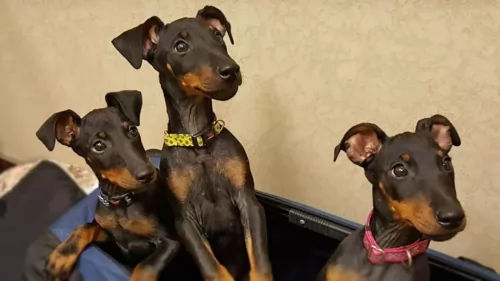 Make sure you provide your pet with yard space and that he is well exercised and occupied. Provide him with exercise and give him attention.
Make sure you provide your pet with yard space and that he is well exercised and occupied. Provide him with exercise and give him attention.
Provide him with a dry, quiet resting place. If he spends time outdoors, he must have shade and sun as well as shelter from the rain.
Provide him with good food in his own special bowls. If you feed him dry kibble, make sure to give him a quality one with vitamins and minerals. The food’s labeling will guide you as to what to buy, but your vet is also a good source of useful information. Try to give him some home-made food too. Boiled chicken, brown rice, sweet potatoes and spinach for instance, are excellent examples. Dont add in exotic spices and curries that can give him an upset stomach. Make sure he has a constant supply of fresh, cool water.
Get your Manchester to the vet if he is ill. Make sure his vaccines are up to date.
He has short hair and is a low maintenance dog. Brush him once or twice a week to keep his shiny coat healthy. Check inside his ears for redness and give him a good check-over to make sure he doesn’t have any odd looking lumps or sores on his body.